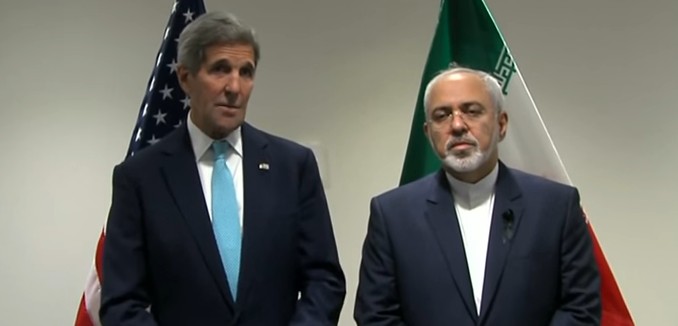The increasing diplomatic activity between the United States and Iran, and specifically between Secretary of State John Kerry and Iranian Foreign Minister Mohammad Javad Zarif, has “unsettled” longtime American allies, the Associated Press reported on Wednesday.
The Obama administration has insisted that the nuclear deal that Iran signed with global powers would not, in the AP’s words, “signal a strategic realignment that would forsake longstanding U.S. allies like Israel or the Gulf state Sunni monarchies.” But the Obama administration’s actions towards Iran have led many partner nations to suspect just that.
While the administration has insisted that it would be strict in enforcing non-nuclear sanctions against Iran, it has not done so in practice. At the end of last year, the White House indefinitely delayed imposing of sanctions against Iran for its illicit ballistic missile test in October.
Washington also took no action after an Iranian ship fired rockets near the USS Harry S Truman in the Persian Gulf a few weeks ago.
Kerry has called Zarif at least 11 times this year. Saudi foreign minister twice. Many others only once. https://t.co/DmLA1MGdjH
— Brad Klapper (@bklapperAP) January 13, 2016
The AP report also noted that Republicans are increasingly uncomfortable with the warming ties, as they believe it means that deal is “preventing Obama from dealing assertively with Iran, because he is more concerned with protecting his signature foreign policy achievement.”
Josh Rogin and Eli Lake of Bloomberg View reported Tuesday that many respected foreign policy insiders have made similar observations. Aaron David Miller, a former high-ranking State Department official, told Rogin and Lake that the White House “is going to remain hostage from now until they leave office to the games the Iranians play and to Iranian behavior that falls outside the four corners of the [nuclear] agreement.” James Jeffrey, President Barack Obama’s ambassador to Iraq from 2010-2012, told them that Iran is convinced that the Obama administration is so committed to maintaining the nuclear that it can act aggressively with impunity. Rogin and Lake described the administration’s non-reactions to Iranian provocations as “becoming the norm in the U.S.-Iran relationship in the wake of the Iran deal, even as Iran escalates tensions with the U.S. and its allies.”
Rogin and Lake also recently reported the growing concern regional allies have over the marked American tilt towards Iran.
The observation that the White House’s growing ties to Iran were inhibiting its ability to counter Iran’s destabilizing behavior was noted by Washington Post deputy editorial page editor Jackson Diehl last July, shortly after the nuclear deal was announced.
[Obama] has starved Syrian rebel forces of the arms and training they seek to defeat Iran’s closest ally. He declined to speak up for Iran’s domestic opposition even when it staged a street rebellion against the regime in 2009. He has never attempted to secure Iranian compliance with human rights norms, as did Cold War treaties with the Soviet Union. At his news conference last Wednesday, he coldly described the possibility of a strengthened Hezbollah, Iran’s proxy army in Syria and Lebanon, as an acceptable tradeoff for the nuclear deal.
[Photo: Reuters / YouTube ]




